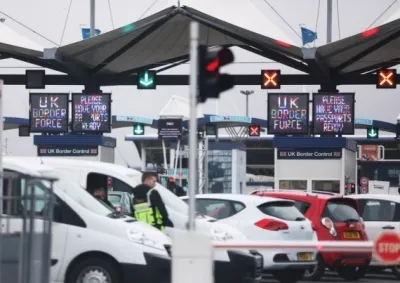Are Multiple Countries Now Limiting Immigration?

Synopsis
Key Takeaways
- Countries globally are tightening immigration policies.
- Stricter visa regulations are leading to increased refusals.
- Refugee admissions are being managed more stringently.
- New laws may impact skilled workers and students significantly.
- Some nations aim to streamline immigration rather than restrict it.
New Delhi, Sep 20 (NationPress) The evolving global landscape, societal pressures, and vested interests are reshaping the policies of nations that once welcomed immigrants, whether to enhance their workforce with skills and experience or out of humanitarian concern.
Countries like the United States and United Kingdom have historically benefitted from skilled immigrants. For instance, numerous Indian engineers and IT professionals have significantly contributed to Silicon Valley in the US, while adept medical practitioners constituted the core of the UK's healthcare system.
However, the tide has changed. In the US, authorities are actively deporting individuals suspected of being undocumented immigrants, often to undisclosed locations. Additionally, visa regulations for professionals are becoming increasingly stringent.
In the previous year, the UK implemented reforms that tightened asylum and settlement protocols. Lengthier qualifying periods were instituted for ‘Indefinite Leave to Remain’, alongside stricter ‘Skilled Worker’ occupation criteria that ultimately raised costs for sponsors.
Mirroring the actions of the US Immigration and Customs Enforcement, the UK government under Rishi Sunak proposed legislation to deport illegal entrants to Rwanda. Despite considerable opposition due to concerns over the host country's conditions, the Safety of Rwanda (Asylum and Immigration) Bill was passed and received Royal Assent in 2025.
The implementation of this law has been gradual, establishing a legal framework for transferring certain asylum seekers to Rwanda for processing and potential resettlement.
Moreover, the UK has introduced modifications to visa regulations impacting legal immigrants. Stricter guidelines now apply to visitors, students, and healthcare professionals.
The Keir Starmer-led government has largely maintained these restrictions, with the UK Home Office recently reporting a significant decline in asylum claims through legal migration channels due to the introduction of “tough new measures”.
The visa adjustments encompass stricter asylum protocols, proposals to extend settlement timelines, targeted tightening of skilled-worker regulations, and enhanced enforcement and service reforms.
According to the UK Home Office, there has been a “notable surge in visa application refusals and a 10 percent decline in student asylum claims.” The refusal rates for short-term study visas have escalated from 45 percent to 68 percent, while rejections for skilled worker visas surged from 3 percent in 2023 to 21 percent by June 2025.
Simultaneously, Canada has intensified integrity checks for student and temporary worker pathways, increased scrutiny on educational sector participants, tightened post-study work conditions in some streams, and raised application fees and biometrics charges in recent revisions.
Germany has boosted land border patrols, while the European Union's 2024 Migration Pact introduces stricter external controls.
Other nations like Australia have recalibrated their temporary skilled migration policies, increasing sponsorship and visa fees, implementing more stringent labor market tests, and enforcing tighter regulations for specific student and graduate post-study work pathways.
New Zealand has similarly tightened its work and student visa regulations and increased fees while imposing stricter labor checks and targeted pathways for critical skills.
Israel has introduced an Electronic Travel Authorization (ETA) requirement for many previously visa-exempt visitors, along with associated processing fees.
Numerous EU nations and the Schengen area have revised visitor regulations, implementing e-visa or electronic travel authorization (ETA) initiatives, while some countries have modified national visa fees or added electronic pre-travel authorizations.
Several Gulf states have also updated fee structures and entry permit regulations as they expand e-visa systems and tourist or business access, while tightening work permit rules for specific sectors.
Even some Asian countries have revamped e-visa eligibility, electronic pre-authorization, and fee schedules, sometimes increasing fees or implementing new paid ETA and registration requirements.
However, not all of these nations seek to limit legal entry; rather, they aim to streamline travel regulations or manage immigration more effectively.






